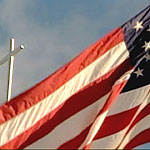2006年VOA标准英语-Experts: Republican Party Losing Hold on Christ(在线收听)
By Leta Hong Fincher
Washington, DC
26 October 2006
watch Politics & Religion
 |
||
--
They call themselves "values voters" -- Christian conservatives who helped secure Republican President George Bush's victory in the 2004 election. But this year, many "values voters" appear unmotivated to turn out on Election Day.
Christian conservatives complain Republicans in Congress have not lived up to their commitments on issues such as restricting abortion or banning gay marriage.
Reverend Louis Sheldon is head of the Traditional Values Coalition, a lobbying group in Washington D.C. that represents tens of thousands of churches. "They [Republicans] have overlooked what the base is and they've walked away from it."
Even before the sex scandal involving former Republican Congressman Mark Foley, political analysts say religious conservative support for the Republicans had waned.
John Green is an expert on religion and U.S. politics at the Pew Forum on Religion and Public Life in Washington D.C. "There's some real question as to whether Christian conservative voters will be as enthusiastic as they were in past elections for a whole variety of reasons, not the least of it being the decline in President Bush's popularity. So the leaders of Christian conservative organizations want to make a real effort to make sure that those folks are enthusiastic and turn out to vote in large numbers."
One way to ensure conservative voter turnout is to rally opposition against same-sex marriage.
Tony Perkins is head of the conservative Family Research Council, which recently sponsored a summit of almost 2,000 "values voters" in Washington D.C. Topics included how to get church voters to the polls and how to persuade pastors to preach a social conservative agenda.
"We see America on this collision course between religious freedoms and the homosexual agenda. At their core these are spiritual battles that we're engaged in. And we need America's spiritual leaders to be at the forefront of this fight."
Critics argue voter-turnout drives sponsored by the religious right violate tax law, which says churches cannot endorse or oppose candidates for public office.
Reverend Barry Lynn is head of Americans United for Separation of Church and State. Lynn's group recently mailed letters to more than 100,000 churches in 11 states warning them against getting involved in political campaigns. "Houses of worship cannot become cogs in anyone's political machine."
The Internal Revenue Service has stepped up investigations into alleged church involvement in partisan activities. In a recent case, the I.R.S. issued a summons to the liberal All Saints Church in the western state of California, over a sermon denouncing the war in Iraq days before the 2004 election.
Still, the I.R.S. actions appear to have had little effect on efforts by the right or the left to woo religious voters. New, progressive organizations have emerged to challenge the religious right on moral values.
The liberal evangelical magazine Sojourners has distributed tens of thousands of voter guides called "Voting God's Politics." The brochures discuss issues such as helping the poor, global warming, and withdrawing troops from Iraq.
Jim Wallis is editor of Sojourners and a founding member of the liberal group, Red Letter Christians. "The monologue of the religious right is finally over and a new dialogue has just begun. That's good news for the churches, and I think for politics, and really for both parties."
That may be wishful thinking, according to religion and politics expert Green. He says, despite Christian conservative disaffection with the Republican Party, the religious left lacks the organizational power of the religious right--at least for the moment. "After all, religious conservatives spent about 40 years figuring out how to do politics effectively, and they've really become very good at it. So it may take a little while for progressives and liberals to reach to the same level of organization."
Green adds many religious moderates have not yet decided which party they will support in the elections. And they, too, will help determine who wins in November.